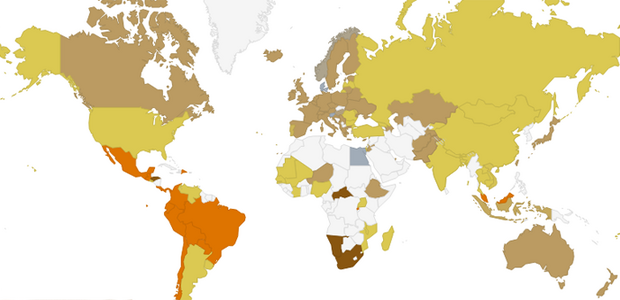
Project
 World Income Inequality Database (WIID)
World Income Inequality Database (WIID)
Theme: Transforming societies
A UNU-WIDER special panel is to be hosted by the Development Days 2020 conference organized by the Finnish Society for Development Research (FSDR) on Friday, 28 August 2020. The theme of Development Days 2020 is 'Inequality Revisited: In Search of Novel Perspectives on an Enduring Problem'.
For information about attending the panel and the conference, please visit the conference registration page.
The panel will focus on monitoring, understanding, and addressing inequality, both within and between countries. Addressing inequality is not only a priority for normative reasons, but also given the implications it may have for economic growth and development, peace and stability, governance, and social cohesion. Reducing all types of inequality is now part of the agenda of governments, international organizations, and other international actors. The formulation of Sustainable Development Goal 10 —reduced inequalities— is an excellent expression of this.
Acheiving this goal, however, still faces important challenges on the research side, for instance, with respect to developing methodologies and collecting data, especially on low and middle-income countries and for longer-term analyses. The special panel will share empirical patterns and major trends in the formation of inequalities and build on our understanding of inequality as both an outcome and a causal variable.
What factors influence change in inequality, and in turn what does inequality mean for key economic, political, and social outcomes? How might inequality be addressed and more inclusive institutions be built? The panel will consider both inequalities between individuals and households (vertical inequalities) and inequalities between groups (horizontal inequalities), including those defined by ethnicity, race, gender, and geographic region.
Michael Danquah — UNU-WIDER Research Fellow (Chair)
Antti Pelanteri — UNU-WIDER Economics Database Administrator
Markus Jäntti — Professor of Economics at the Swedish Institute for Social Research, Stockholm University
Ayu Pratiwi — Postdoctoral Researcher at University of Turku
Simone Schotte — UNU-WIDER Research Associate
Antti Pelanteri – Income inequality
Different levels of income equate to different levels of well-being. The World Income Inequality Database (WIID), hosted by UNU-WIDER for two decades, is used extensively for research on how income is distributed, and on a broad range of socio-economic issues related to income inequality. Mr. Pelanteri will discuss trends and measurement issues in global inequality using the latest version of the WIID.
Markus Jäntti – Income distribution in Uganda – a tax register-based assessment
Uganda has extensive register data on taxable income and taxes paid going back a decade or so. By combining register data with other sources, including census data, national accounts, and household surveys, it is possible to estimate the distribution of both pre-fiscal and post-fiscal distribution starting in 2009. It is also possible to estimate for a subset of the population income mobility and income variability. This paper presents the first such estimates, broken down also by region, and discusses challenges that lie ahead.
Ayu Pratiwi – Land inheritance and gender: long term implications on intergenerational wealth allocation, education and female empowerment
Tanzania introduced in 1998 a one of the most radical land laws in Africa. The framework stipulated that women would be represented in the land administration bodies that protect women’s rights to co- ownership of land, as well as the individual right to acquire, hold, sell and use land. In this study we are using a unique panel (KHDS) from Tanzania that stretches from the start of 1990s to 2010 to investigate the impacts of women’s property rights on intergenerational wealth allocation, education and female empowerment.
Simone Schotte – Predicting the global distribution of routine and non-routine work
Over the past decade, there has been an explosion of interest in studying patterns and trends in the task content of jobs, in order to improve understanding of how the twin forces of trade and technology shape the nature of work around the world. This research commonly assumes that the task content of occupations is identical across countries and can be captured using US O*NET occupation-specific task data. However, for less developed countries, this assumption may be highly problematic, given that large differences in labor productivity, technology adoption, and skills persist, and, in consequence, jobs may utilize different skills and involve different tasks across countries. To address this issue, we use survey data collected in 46 low, middle, and high-income economies to develop a regression-based methodology that allows us to predict the country-specific routine task intensity (RTI) of occupations. We then combine the country-specific and O*NET based task measures with time series data on occupational structures in 87 countries that together employ more than 2.5 billion workers. Both measures indicate a gross reallocation of labor away from routine towards non-routine tasks in all country groups. However, our country-specific measures show that the decline in RTI has been faster in high-income countries than in the rest of the world, leading to a widening gap in RTI due to an increasing concentration of non-routine work in high-income countries, and of routine work in low and middle-income countries.